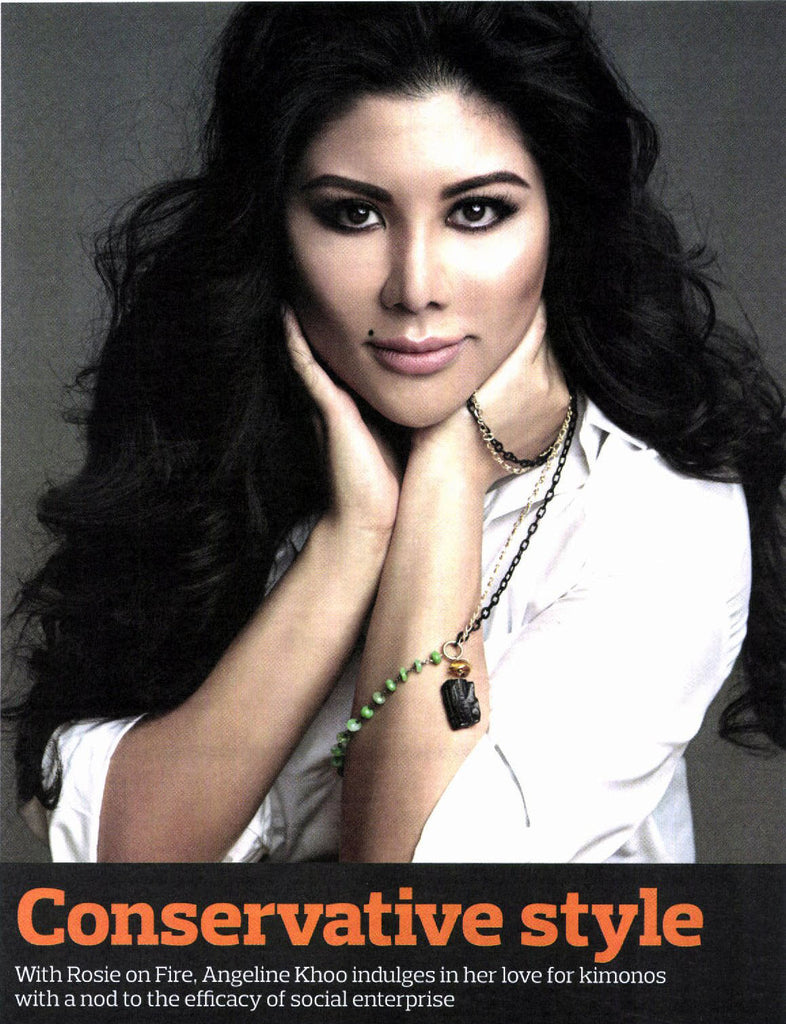Rosie On Fire in The Edge


Driven by the desire to run her own business, the University of Buckingham law graduate, who also holds a master's in social anthropology from Oxford University, founded her unusual fashion brand after a year of research and experimentation. Officially launched last December, Rosie On Fire specialises in modern interpretations of the kimono. The silky flowing apparel can be worn in a variety o ways - over a dress for a formal event or with a tank top and jeans as a laid-back weekend ensemble.
 Khoo says she has always been drawn to fashion, an interest she attributes to her mother. As a personal fan of the modern kimono that is playful, feminine and flirty, picking the preferred apparel was the easiest part of setting up her brand. "Kimonos have been popular in Canada, where I was raised, for many years now. It is something I have always worn because it is very flattering. It is sexy but also conservative. But when I came back to Malaysia in 2013, I realised the trend had not [caught on] here and kimonos were not as popular as they were overseas."
Khoo says she has always been drawn to fashion, an interest she attributes to her mother. As a personal fan of the modern kimono that is playful, feminine and flirty, picking the preferred apparel was the easiest part of setting up her brand. "Kimonos have been popular in Canada, where I was raised, for many years now. It is something I have always worn because it is very flattering. It is sexy but also conservative. But when I came back to Malaysia in 2013, I realised the trend had not [caught on] here and kimonos were not as popular as they were overseas."
One remarkable aspect of Rosie On Fire is that the kimonos are made by marginalised women or those from low-income families. She seeks out the tailors by word of mouth or through personal recommendations. "My mum has been involved in a lot of women's rights work and my younger brother is autistic. He and I are best friends and I've seen that the right opportunities and care can really change someone's life," Khoo explains when asked why she chose a business model with a social element to it. Recently the brand sponsored two children under Metro World Child organisation that serves inner-city children in New York and various urban centres around the world.
Khoo tries to be as closely involved with the whole manufacturing process of the business as possible. Typically, that means sourcing and handpicking the fabrics - mostly from South Korea but also from Jakarta and Bali. "Sometimes, it involves going into back alleys to find that perfect roll of fabric," she says excitedly. The patterns are then passed on to the tailors, who prepare each item of clothing. The kimonos are photographed for the online store upon inspection and quality check.
"We get a lot of orders from London, the US and Canada and some from Singapore," Khoo says. Response from Malaysian and international clients has been equal, she adds. In fact, the response has been so good that the brand will soon produce the kimonos in factories too, to cope with the demand.
Looking back on her journey thus far, Khoo says there have been challenges in getting the brand up and running. "With a start-up, you have to do everything from registering a business to setting up a bank account - things you never had to do before." That aside, "fear is the biggest challenge", she admits. "No matter how much of other experiences you have, there is always a first time."
Khoo cites language barrier as a challenge when it comes to dealing with the artisans who sew the kimonos. But she is determined to overcome that by taking lessons on conversing in Bahasa Malaysia. But beyond this, she describes the entire experience of having her own fashion brand as thoroughly exciting, fun and rewarding.
For now, Rosie On Fire operates via an online store shop with pop-ups in malls every now and then. "Malaysians still like to go into shops to touch and feel the pieces. People who come to our pop-up stores often ask if we have a shop." This frequent query has led to Khoo's next big idea for the brand. "In the next six months, we'll launch a boutique!" she says enthusiastically.
This first bricks-and-mortar store will mark a milestone for Rosie On Fire, which hopes to extend its current offerings. "Kimonos will always be staple but my dream is to build a proper lifestyle brand," Khoo says.